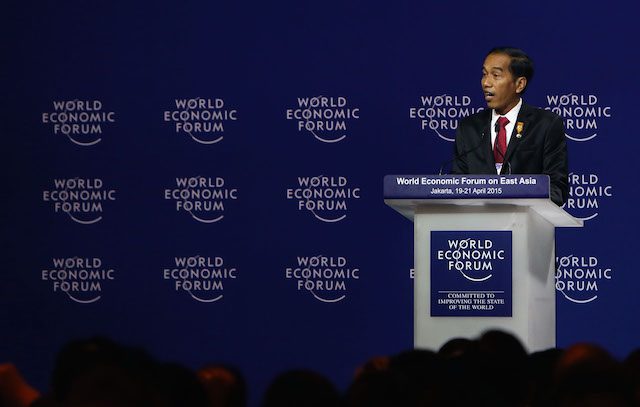SUMMARY
This is AI generated summarization, which may have errors. For context, always refer to the full article.

JAKARTA, Indonesia – The challenges faced by Indonesia should be seen as opportunities by foreign investors, Indonesian President Joko “Jokowi
Widodo said on Monday, April 20, at the World Economic Forum in East Asia 2015.
And if investors encounter problems, the president has this advice: “Call me.”
Jokowi may not have meant it literally, but investors might wish it was indeed that easy to get through the country’s notorious red tape. Even government projects encounter delays because of land acquisition challenges in the country.
But the president has been wooing foreign investors since his inauguration in October 2014, promising investor-friendly policies such as easier issuance of business permits. The Asian Development Bank (ADB) estimates Indonesia requires $500 billion in the next 5 years to develop its infrastructure, and much of that is expected to come from foreign investors. (FULL SPEECH: Jokowi at APEC CEO Summit 2014)
Jokowi, who has struggled to maintain his high popularity rate since being inaugurated in October 2014, said he was “extremely optimistic” despite the challenging economic conditions.
“I’m 100% confident, Indonesia will prevail,” he told the room full of government and business leaders from more than 40 countries.
This is despite Indonesia’s slowing economic growth, the rupiah breaching 16-year lows, and commodity prices crashing. (READ: Indonesia’s economic growth hits 5-year low)
“We have done it before. And we shall do it again,” he said.
Indonesia and change
The key, Jokowi said, is to reinvent the economy.
In the 1970s, Jokowi said Indonesia became rich on oil exports. “At the time, Indonesia was the only member of OPEC (Organization of Petroleum Exporting Countries) in Asia. Our energy minister, Subroto, was secretary general of OPEC.”
But crude oil prices crashed in the 1980s, forcing Indonesia to devalue its currency and leading to an economic crisis.
“With crisis came an opportunity,” he said. “After the 1980s, Indonesia began to industrialize. For the next 15 years, we built up the textile and garment industry, the pulp and paper industry, the palm oil industry, chemical industries.”
By 1995, Jokowi said Indonesia’s oil and gas exports were only 30% of the country’s total exports, with the rest taken up by goods and services.
To respond to the current situation, the president said the Indonesian economy must shift away from relying on consumption to fuel GDP growth to production. He said investments are needed in infrastructure, industries, and, most importantly, human capital, which he called “the most precious resource of the 21st century.”
“Change can be painful. It will create winners and losers. But there can be no progress without change. No gain without pain,” he said.
Other challenges
Investors, though, have noted other challenges that have cropped up under Jokowi’s administration.
For instance, earlier this year, Jokowi, who pledged to bring in a clean government and stay away from politicking, came under fire for not supporting the once powerful Corruption Eradication Commission (KPK) in its fight against the National Police.
Jokowi hesitated to withdraw Budi Gunawan as his nominee for police chief despite KPK naming the police general a corruption suspect, leading to severe criticisms of the president. (READ: Investors worry: What’s happening to Jokowi’s anti-graft drive?)
Since then, KPK supporters and local media have said the anti-graft agency has become significantly weaker. (READ: Can Indonesia save the last reformasi remnants?)
Also, earlier this month, the American Chamber of Commerce in Indonesia (AmCham) also said it was deeply concerned about “the potential negative impact on the foreign investment environment of the April 2 guilty verdicts against two teachers, Ferdinand Tjiong, an Indonesian and Neil Bantleman, a Canadian at the Jakarta Intercultural School – formerly the Jakarta International School.” (READ: Canadian, Indonesian jailed over Jakarta school sex abuse)
There is widespread belief in the Indonesian expatriate community that no credible evidence exists against Tjiong and Batleman. The embassies of the United States, Canada, and United Kingdom have all issued statements of concern over the verdict.
“As such, at a time when the Government of Indonesia is seeking to promote quality economic growth and increased foreign and domestic investment in targeted areas, these cases have captured the world’s attention and we urge the courts to proceed with the utmost care to address the expected and current appeals in a robust and transparent manner to ensure outcomes that are evidence-based and consistent with the rule of law to achieve justice and fairness for all concerned,” the AmCham statement said.
Investors might be asking if they can call Jokowi about these. – Rappler.com
Add a comment
How does this make you feel?
There are no comments yet. Add your comment to start the conversation.